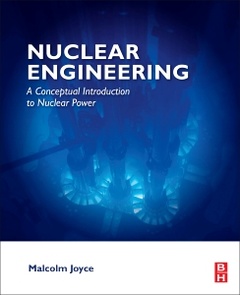Nuclear Engineering A Conceptual Introduction to Nuclear Power
Auteur : Joyce Malcolm

Nuclear Engineering: A Conceptual Introduction to Nuclear Power provides coverage of the introductory, salient principles of nuclear engineering in a comprehensive manner for those entering the profession at the end of their degree. The nuclear power industry is undergoing a renaissance because of the desire for low-carbon baseload electricity, the growing population, and environmental concerns about shale gas, so this book is a welcomed addition to the science. In addition, users will find a great deal of information on the change in the industry, along with other topical areas of interest that are uniquely covered.
Intended for undergraduate students or early postgraduate students studying nuclear engineering, this new text will also be appealing to scientifically-literate non-experts wishing to be better informed about the ?nuclear option'.
1. Fundamental concepts 2. Historical context 3. Fundamentals of radioactivity 4. The fission process 5. The actinides and related isotopes 6. Moderation 7. Cooling and thermal concepts 8. Elementary reactor principles 9. The reactor equation and introductory transport concepts 10. Mainstream power reactor systems 11. Advanced reactors and future concepts 12. Nuclear fuel manufacture 13. Nuclear fuel reprocessing 14. Nuclear safety and regulation 15. Radioactive waste management and disposal 16. Public acceptability, cost and nuclear energy in the future
Malcolm Joyce holds a Personal Chair in Nuclear Engineering at Lancaster University and was Head of Department from 2008-2015. His industrial experience includes Smith System Engineering Ltd., BNFL plc. and most recently as Technical Director of Hybrid Instruments Ltd.
His area of research interest is in Nuclear Engineering including nuclear safeguards instrumentation, portable neutron spectrometry,decommissioning-related analytical methods, nuclear policy and environmental consequences, medical radiotherapy & radiation effects. He is author on > 130 refereed journal articles and has specialised over the last 10 years in the field of digital mixed-field radiation assay with fast, organic liquid scintillation detectors. Prior to this he spent four years in research in industry and has a h-index of 26. An impact case study based on Professor Joyce's research submitted to the 2014 Research Excellent Framework was assessed as being of 4* quality.
Professor Joyce was the Scientific Chair of the Nuclear Institute's International Conference on Control & Instrumentation for Nuclear Installations (September 2011). He is a Chartered Engineer and Fellow of the Nuclear Institute. He is Editor on the Elsevier journal Progress in Nuclear Energy. He led the team in 2010 that researched and wrote the Nuclear Lessons Learned report, on behalf of the Royal Academy of Engineering and Engineering the Future. In October 2012, the degree of Doctor of Engineering (DEng) was conferred upon him in recognition of his contribution to the field of Fast Neutron Digitization and Related Analytical Methods. He is a member of the UK Government's Nuclear Industry Research Advisory Board (NIRAB), and elected member of the IEEE Radiation Instrumentation Steering Committee (RISC) and deputy chair of the steering committee of the National Nuclear Users' Facility (NNUF). In 2014 he and his team were awarded the James Watt medal by the Institution of Civil Engineers (ICE) for best paper i
- Presents a succinct and clear explanation of the key facts and concepts on how nuclear engineering power systems function and how their related fuel supply cycles operate
- Provides full coverage of the nuclear fuel cycle, including its scientific and historical basis
- Describes a comprehensive range of relevant reactor designs, from those that are defunct, current, and in plan/construction for the future, including SMRs and GenIV
- Summarizes all major accidents and their impact on the industry and society
Date de parution : 09-2017
Ouvrage de 420 p.
19x23.3 cm
Disponible chez l'éditeur (délai d'approvisionnement : 14 jours).
Prix indicatif 66,19 €
Ajouter au panier


